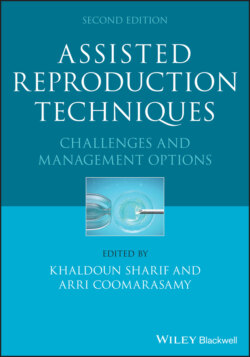Читать книгу Assisted Reproduction Techniques - Группа авторов - Страница 21
Ovarian cancer
ОглавлениеOvulation is considered to be a potential biologic promoter of ovarian cancer, which is called the “incessant ovulation” hypothesis. A second hypothesis is that gonadotropin stimulation increases the risk of malignant changes directly, or by acting in combination with a raised concentration of estrogen. Yet another hypothesis frequently suggested by epidemiological data is that undiagnosed early ovarian cancer causes, in some manner, infertility [25]. Data from 12 case‐control studies conducted in the period 1956–1986 showed pregnancy, breastfeeding and oral contraceptive use induce biological changes that protect against ovarian malignancy. A small fraction of the excess ovarian cancer risk among nulliparous women was due to infertility [26]. Only 3 of the 12 studies examined the association between the use of fertility drugs and invasive ovarian cancer. One study showed an increased risk of ovarian cancer in infertile women who had used fertility drugs. This study had several limitations. Subsequently, a large cohort study [27] suggested an increased risk of invasive and borderline ovarian tumors, a finding that was supported by other studies [28,29]. A pooled analysis of case‐control studies showed fertility drug use in nulligravid women was associated with borderline serous tumors but not with any invasive histologic subtypes [30]. Several other epidemiological studies showed no convincing association between the use of fertility drugs and risk of ovarian cancer [18,31–34].
An important group of women who are at increased risk of developing ovarian cancer are those with BRCA1 and BRCA2 gene mutations. Recent studies suggested that BRCA mutation carriers may have decreased ovarian reserve compared with women without BRCA mutations [35,36]. The studies suggested that treatment for infertility does not significantly increase the risk of ovarian cancer among women with a BRCA mutation [37,38]. A meta‐analysis of nine cohort studies showed that IVF is not associated with ovarian cancer when the confounding effect of infertility was adjusted for in such studies [39]. A recent Cochrane review consisting of 24 cohort studies and 13 case‐control studies concluded that there is no convincing evidence of an increase in the risk of invasive ovarian tumors with fertility drug treatment, and even women with a BRCA genetic mutation are not at increased risk due to fertility treatment [25]. Risk of borderline ovarian tumors may be increased in infertile women treated with in vitro fertilization, but the evidence is classed as low grade [25].
To summarize, current evidence is sufficient to reassure women that there is no clear increase in the risk of invasive ovarian cancer following the use of fertility drugs. A few studies have shown a small increase in the absolute risk of borderline ovarian tumors after fertility treatments, but this risk is small, and the evidence is insufficient to recommend against the use of fertility medications to avoid borderline ovarian tumors [24].
